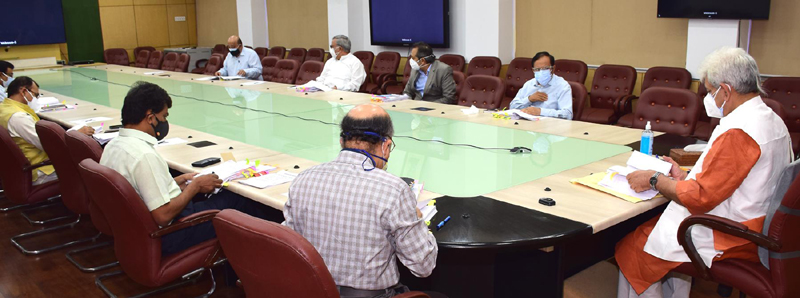High density plantation nurseries scheme cleared
Excelsior Correspondent
JAMMU, Apr 29: The Administrative Council (AC), which met here today under the chairmanship of Lieutenant Governor, Manoj Sinha, approved the proposal of the Health and Medical Education Department to create 196 posts for the State Cancer Institute (SCI) at the Super Specialty Hospital, Jammu. The new posts have been created to adequately meet the requirement of faculty, technical, paramedical and administrative staff of the cancer treatment institute coming up in the Union territory.
To strengthen tertiary level cancer care facilities, the State Cancer Institute is being established at an estimated cost of Rs 120 crores under the Centrally Sponsored Scheme ‘National Programme for Prevention and Control of Cancer, Diabetes, CVD, and Stroke (NPCDCS) .
SCI will function as an apex institute for cancer-related treatment which will mentor and coordinate activities of other institutes. It will also provide outreach services, diagnosis, and referral treatments, develop treatment protocols and undertake cancer research to enhance the efficacy of treatment in Jammu and Kashmir.
Meanwhile, Administrative Council has also approved the proposal of the Health and Medical Education Department to upgrade the sub-centre Marothi to New Type Primary Health Centre (NTPHC).
The decision will strengthen health care facilities in far-flung area of Marothi in tehsil Chenani of district Udhampur. The up-gradation will benefit 29,000 habitants from remote areas of Marothi, Chukal, Sarar, Maramti (Doda), and the nomadic population.
The Administrative Council also approved creation of 5 additional posts of Medical Officer, Junior Pharmacist, FMPHW, Nursing Orderly, and office-help to further strengthen the medical facilities at the NTPHC.
To streamline the career progression in the department of Floriculture, Gardens and Parks, the Administrative Council approved restructuring the department’s administrative machinery by rationalizing various categories of existing posts.
The Administrative Council approved creation of 2 posts of Deputy Director by corresponding reduction of 1 post each of Project Officer and Botanist as per the J&K Floriculture (G) Service Recruitment Rules, 2010. The decision will decentralize the administrative hierarchy towards efficient functioning and streamline career progression of officers in the department.
The Administrative Council (AC) accorded approval to the construction of protection bund on river Devak along the boundary wall of the AIIMS, Vijaypur by the Irrigation and Flood Control Department.
The flood protection project will be completed in two years at an estimated cost of Rs 27.90 crore and will safeguard the AIIMS infrastructure from damages in the event of a flood.
The protection works will include flood protection works between Railway Bridge and NH bridge (650 metre), and downstream of NH bridge to village Tarapur, (2.22 kms) besides construction of 12 metre spur along the left and right bank of river Devak and construction of 3 diversion channels.
Meanwhile, the Administrative Council (AC) also approved transfer of land measuring 27 Kanal to the Health & Medical Education Department for developing infrastructure under the Indian System of Medicine (ISM).
The Administrative Council approved the transfer of parcels of land measuring 11 Kanal and 16 Kanal to establish a 50-bedded AYUSH hospital at Baramulla and herbal garden at Pulwama, respectively.
Considering the fact that Jammu and Kashmir is a treasure trove of herbs and traditional medicine, the Health & Medical Education Department is committed to conservation and development of alternative medical practices.
The Administrative Council also approved the implementation of the high-density plantation nurseries scheme for private entrepreneurs and start-ups in the horticulture sector. The scheme will be in force for a period of 5 years.
The new scheme in line with the Atmanirbar Bharat Abhiyan, will provide 50% subsidy through direct benefit transfer to entrepreneurs for establishing high-density plantation nurseries to locally developed rootstocks. It will substantially reduce the cost of obtaining planting material by doing away with the need of keeping the imported plants in quarantine for 2 years before their transplantation, besides reducing the mortality rate of imported rootstocks.
The farmer-centric scheme will be implemented for apples, walnut, almond, cherry, litchi, and olive among others. It will give a boost to employment opportunities by creating more than 0.6 million man-days jobs per year and will make the sector self-reliant in terms of inputs required for high-density plantations.
The shift to high-density plantations is expected to make horticulture hugely profitable through superior and higher yields per hectare, early harvest, and introduction of insect and pest resistance varieties- invariably saving the expenditure on disease and pest control. It will go a long way in enhancing the quality and quantity of horticulture produce for doubling the farmer’s income.
It will substantially reduce the cost of obtaining planting material by doing away with the need of keeping the imported plants in quarantine for 2 years before their transplantation, besides reducing the mortality rate of imported rootstocks.
The farmer-centric scheme will be implemented for apples, walnut, almond, cherry, litchi, and olive among others. It will give a boost to employment opportunities by creating more than 0.6 million man-days jobs per year and will make the sector self-reliant in terms of inputs required for high-density plantations.
The shift to high-density plantations is expected to make horticulture hugely profitable through superior and higher yields per hectare, early harvest, and introduction of insect and pest resistance varieties- invariably saving the expenditure on disease and pest control. It will go a long way in enhancing the quality and quantity of horticulture produce for doubling the farmer’s income.


